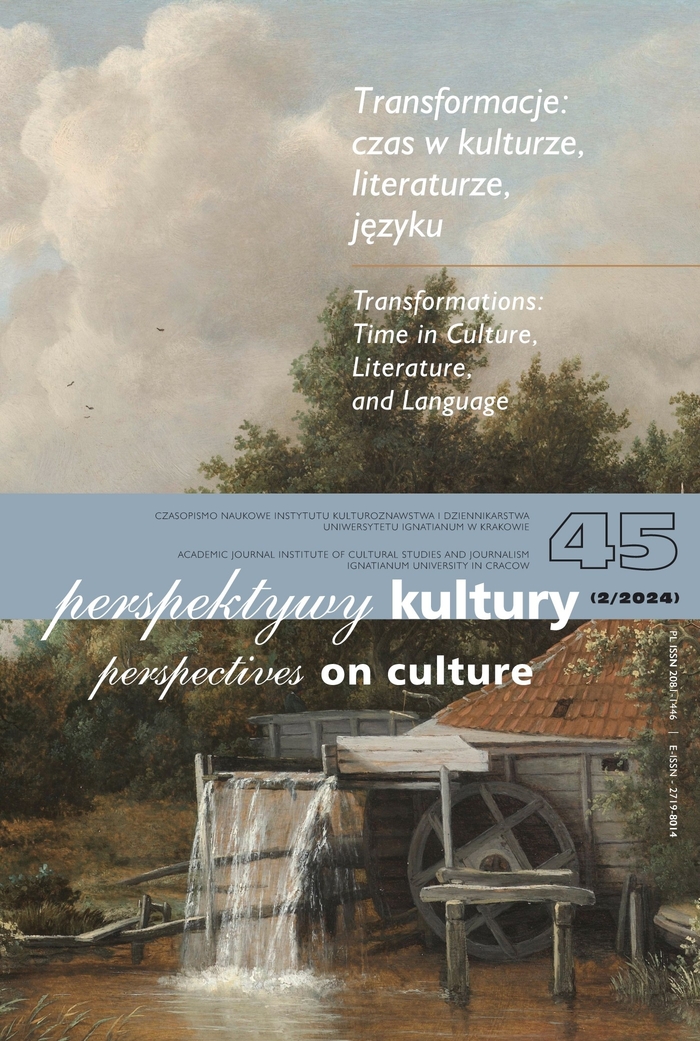Narracje progu
pejzaż czasowy i powieść w antropocenie
Abstrakt
Artykuł omawia perspektywę pejzażu czasowego w gatunku powieści. Wskazuje, że pejzaż czasowy to narzędzie analityczne, które na pierwszy plan wysuwa zdolność powieści do skonfrontowania antropocenu z narracjami progu. Konceptualnie pejzaż czasowy dotyczy nieuchwytnych interakcji pomiędzy życiem a materią. Uwydatnia skomplikowane zestawienie kulturowo ukształtowanego ludzkiego czasu z nielinearnym porządkiem czasowym Ziemi. Powieść nadaje tym wzajemnym relacjom chronotopiczną i narracyjną ekspresję, co przedstawiono na przykładzie trzech brytyjskich powieści: Powódź (2005) Maggie Gee, Nie opuszczaj mnie (2005) Kazuo Ishigury oraz Księga Dave’a (2006) Willa Selfa. Wymienione powieści eksplorują różnorodność czasu, łącząc chronotop progu z narracyjnymi pauzami. Ich pejzaże czasowe ujawniają nie tylko egzystencjalne kryzysy wywołane przez antropocen, lecz także czasową inność planety.
Bibliografia
Adam, B. (1998). Timescapes of Modernity: The Environment and Invisible Hazards. London: Routledge.
Bakhtin, M. (1984). Problems of Dostoevsky’s Poetics (C. Emerson, Ed. and Trans.). Minneapolis: University of Minnesota Press.
Bakhtin, M. M. (2001). Forms of Time and the Chronotope in the Novel: Notes Toward a Historical Poetics. In: M. Holquist (Ed.), The Dialogic Imagination: Four Essays (C. Emerson and M. Holquist, Trans.). Austin: University of Texas Press, 84-258.
Bjornerud, M. (2018). Timefulness: How Thinking Like a Geologist Can Help Save the World. Princeton: Princeton University Press.
Boxall, P. (2015). The Value of the Novel. Cambridge: Cambridge University Press.
Caracciolo, M. (2021). Narrating the Mesh: Form and Story in the Anthropocene. Charlottesville: University of Virginia Press.
Clark, T. (2015). Ecocriticism on the Edge: The Anthropocene as a Threshold Concept. London: Bloomsbury.
Edwards, C. (2019). All Aboard for Ararat: Islands in Contemporary Flood Fiction. ASAP/Journal, 4(1), 211-238.
Eliot, T. S. (2015). Four Quartets. In: C. Ricks and J. McCue (Eds.), The Poems of T. S. Eliot. Volume 1. Collected and Uncollected Poems. London: Faber and Faber, 177-209.
Gee, M. (2004). The Flood. London: Saqi.
Genette, G. (1983). Narrative Discourse: An Essay in Method (J. E. Lewin, Trans.). Ithaca: Cornell University Press.
Ghosh, A. (2016). The Great Derangement: Climate Change and the Unthinkable. Chicago: The University of Chicago Press.
Gingrich, B. (2021). The Pace of Fiction: Narrative Movement and the Novel. Oxford: Oxford University Press.
Heise, U. K. (2019). Science Fiction and the Timescales of the Anthropocene. English Literary History, 86(2), 275-304.
Ishiguro, K. (2005). Never Let Me Go. London: Faber and Faber.
Kermode, F. (2000). The Sense of an Ending: Studies in the Theory of Fiction. Oxford: Oxford University Press.
Morson, G. S., and Emerson, C. (1990). Mikhail Bakhtin: Creation of a Prosaics. Stanford: Stanford University Press.
Parkes, A. (2021). Ishiguro’s “ Rubbish”: Style and Sympathy in Never Let Me Go. MFS Modern Fiction Studies, 67(1), 171-204.
Self, W. (2007). The Book of Dave: A Revelation of the Recent Past and the Distant Future. London: Penguin.
Shadurski, M. (2023). “City Which Holds All Times and Places”: On Urban Landscape in Maggie Gee’s The Flood. In: M. G. Kelly and M. Paz (Eds.), Utopia, Equity and Ideology in Urban Texts: Fair and Unfair Cities. Cham: Palgrave Macmillan, 319-338.
Taylor, J. O. (2018). The Novel after Nature, Nature after the Novel: Richard Jefferies’s Anthropocene Romance. Studies in the Novel, 50(1), 108-133.
Trexler, A. (2015). Anthropocene Fictions: The Novel in a Time of Climate Change. Charlottesville: University of Virginia Press.
Vermeulen, P. (2020). Literature and the Anthropocene. London: Routledge.
Copyright (c) 2024 Perspektywy Kultury

Utwór dostępny jest na licencji Creative Commons Uznanie autorstwa – Bez utworów zależnych 4.0 Międzynarodowe.
Autor, zgłaszając swój artykuł, wyraża zgodę na korzystanie przez Wydawnictwo Uniwersystet Ignatianum z utworu na następujących polach eksploatacji:
- utrwalania utworu w formie papierowej, a także na nośniku cyfrowym lub magnetycznym;
- zwielokrotnienia utworu dowolną techniką, bez ograniczenia ilości wydań i liczby egzemplarzy;
- rozpowszechniania utworu i jego zwielokrotnionych egzemplarzy na jakimkolwiek nośniku, w tym wprowadzenia do obrotu, sprzedaży, użyczenia, najmu;
- wprowadzenia utworu do pamięci komputera;
- rozpowszechniania utworu w sieciach informatycznych, w tym w sieci Internet;
- publicznego wykonania, wystawienia, wyświetlenia, odtworzenia oraz nadawania i reemitowania, a także publicznego udostępniania utworu w taki sposób, aby każdy mógł mieć do niego dostęp w miejscu i czasie przez siebie wybranym.
Wydawca zobowiązuje się szanować osobiste prawa autorskie do utworu.





